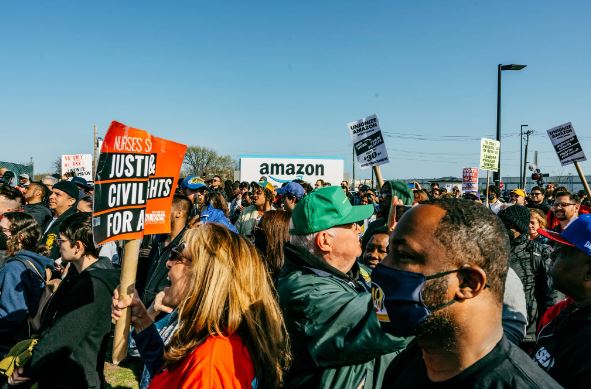Corporate America’s discontent with the National Labor Relations Board (NLRB) reached a new level as Amazon challenged the constitutionality of the 88-year-old federal agency in a legal filing on Thursday. This move comes amidst a growing backlash within corporate circles against the NLRB, with other companies like SpaceX and Trader Joe’s also questioning the agency’s legitimacy in recent actions.
Amazon’s legal filing was part of a case before an administrative judge involving allegations of illegal retaliation against workers at its Staten Island warehouse, JFK8, which unionized two years ago. While vehemently denying any wrongdoing, Amazon’s lawyers raised a bold argument asserting that the structure of the NLRB violates the separation of powers outlined in the United States Constitution. They claimed that the agency impedes executive power as provided for in Article II of the Constitution and argued that its actions violate Articles I and III, as well as the Fifth and Seventh Amendments.
Notably, Amazon’s challenge mirrors a similar argument put forth by SpaceX in a federal lawsuit last month. After the NLRB accused SpaceX of unlawfully firing eight employees for criticizing CEO Elon Musk, the company sued, contending that the labor board’s actions infringed upon its constitutional rights. However, a federal judge in Texas recently granted the NLRB’s motion to transfer the case to California, where SpaceX’s headquarters are located.
In response to Amazon and SpaceX’s legal maneuvers, the NLRB’s general counsel, Jennifer A. Abruzzo, expressed satisfaction that SpaceX’s attempts to evade litigation had failed. Former NLRB Chairwoman Wilma Liebman labeled the arguments made by Amazon and SpaceX as “radical,” emphasizing that the constitutionality of the NLRB had been settled by the Supreme Court nearly 90 years ago.
The broader conservative effort to question the constitutionality of various regulatory actions appears to underpin Amazon and SpaceX’s challenges against the NLRB. This aligns with a trend of corporate entities challenging regulatory oversight, with potential implications for the future of labor rights enforcement in the United States.
In a separate development, the Supreme Court agreed to hear a case brought by Starbucks, which challenges a federal judge’s order reinstating employees terminated during a union campaign. This case could potentially curtail the NLRB’s practice of seeking reinstatement for workers during lengthy litigation processes.
Overall, the challenges mounted by Amazon, SpaceX, and other companies against the NLRB reflect a broader struggle over the balance of power between corporations and labor rights enforcement agencies. As these legal battles unfold, the outcome could have significant implications for the future of labor relations and regulatory oversight in the United States.

